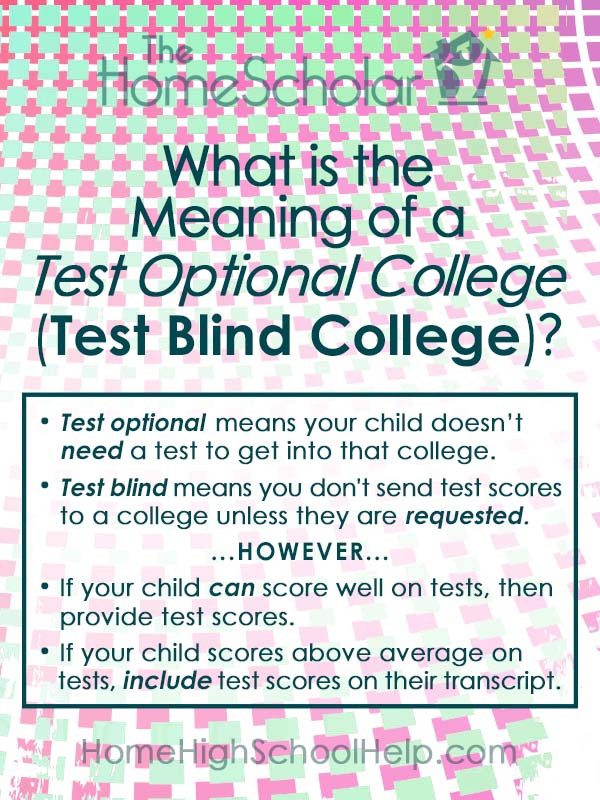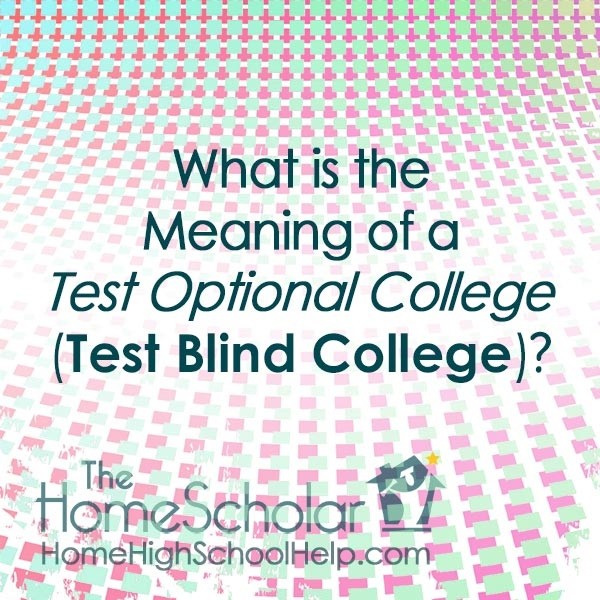Many colleges have now gone to being test optional or test blind. But what does that really mean? Does it affect your chances of earning scholarships if you don’t take those college admission tests?
Should your child send scores to a test optional college?
First, let’s clarify what these terms mean by getting the definitions out of the way right up front.
“Test optional” means you don’t NEED a test to get into that college if you meet all their other admission criteria. “Test blind” means you don’t send them test scores at all (unless requested), and they will not consider tests at all. But, as you might have suspected, that’s not the whole story.
Test optional does NOT mean that they will admit everyone, or give scholarships to everyone, or make college more affordable. Test blind doesn’t mean you are certain of admission even if you do meet admission criteria. If they have a lot of applicants, they have to reject someone, and they may still use tests as defining factors of admittance.
While universities often promise and do work to provide a holistic assessment of students – considering the whole person and the entirety of the application – college admission tests are still an important part of that assessment for homeschoolers. It is also important to realize that test optional colleges are now relying more heavily on letters of recommendation, application essays, and course descriptions, so it is crucial these aspects of your student’s application are fully developed. Finally, though the test might be optional for admission, it might not be optional for homeschoolers, for scholarships, or to put you first in line for consideration—some colleges put the non-tested student LAST in their pile to assess.
My advice:
- If your child CAN score well on tests, then DO provide test scores even at a test optional university.
- If your child does score above average on tests, then DO put test scores on your homeschool transcript so they can see the scores even if they are not submitted directly to the college.
Read these two articles and you’ll be up to speed on test optional current events:
- “UC applicants could continue to submit SAT® and ACT® scores during this period for use in awarding scholarships, and for the state guaranteed admissions provision that grants admission to those in the top eighth of California high schools.” – University of California Votes Down SAT
- “SAT® and ACT® scores routinely increase students’ chances of being admitted to college, receiving more financial aid and placing out of remedial and introductory courses — even at test-optional universities.” – Words Matter
You know about test optional, but what about test essay optional?
Another “optional” piece of the testing puzzle is the optional essay test on the college admissions tests. The SAT® now no longer includes the optional essay, however, the ACT® still does.
While the college admission tests aren’t only about length, they definitely need to be lengthy. Still, 50 minutes to write a well-organized, well-articulated, lengthy essay may seem like a tall order. What about all the steps for creating an essay, like brainstorming, outlines, and editing? Are you a bit worried about “teaching to the test” and having to spend a lot of time practicing the essay?
I know that it’s frustrating when you feel like you are having to “teach to the test.” Let’s try to look at it from a different perspective, though. Writing is a very important skill, and we need to understand that there are two completely different kinds of writing.
First, there is writing that is edited, proofread, and “perfect.” For adults, this can be newsletters, Christmas card letters, and letters to the editor. For children, this can be reports and essays they write, both for fun and for homeschool work.
The second kind of writing is impromptu writing, which has to be good but it doesn’t have to be perfect. This can include casual business writing, job applications, interview questions, etc. For children, the second kind of writing will include essay tests, AP® exams, and the ACT® essay.
These two kinds of writing involve completely different skills. My sons are glad they developed BOTH skills, but I’ve only been formally thanked once. When Alex took his first college essay test, he greeted us that day by saying, “Thank you SO much for teaching us to write a college essay! I aced my test today, and the other kids had trouble writing for a timed test!”
Bottom line? You want to teach your children good quality writing with revisions that include brainstorming, outlining, and writing. It’s also important to teach them to produce good quality writing when they don’t have the luxury of outlining and revisions. You will find your children will use both skills in college and in life.
All colleges admit homeschoolers. It pays to know their admissions policy and plan in advance. No matter what college you are thinking about, make sure you visit! No amount of online comparison can really communicate the differences between schools. College “view” books are created by marketing people trying to make their school look the best. The only way to determine if a college will “fit” is by visiting. Students should look at the college and ask two questions: Can I live here for four years? Can I learn here for four years? Only a visit to a college can provide answers to these questions!





